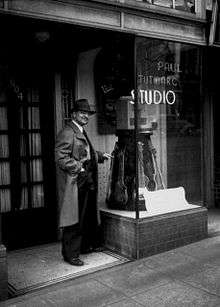Paul Tutmarc
| Paul Tutmarc | |
|---|---|
 Paul Tutmarc outside his Seattle music studio | |
| Background information | |
| Born |
May 29, 1896 Minneapolis, Minnesota, U.S. |
| Died |
September 25, 1972 (aged 76) Seattle, Washington, U.S. |
| Genres | Country, Hawaiian, popular song |
| Instruments | Vocals, Spanish guitar, ukulele, banjo, lap steel guitar, bass guitar, organ |
| Years active | 1908–1972 |
| Associated acts | Sol Hoopii, Bonnie Guitar |
Paul Tutmarc (May 29, 1896 – September 25, 1972) was an American musician and musical instrument inventor. He was a tenor singer and a performer and teacher of the lap steel guitar and the ukulele.[1] He developed a number of variant types of stringed musical instruments, such as electrically amplified double basses, electric basses, and lap steel guitars. His second marriage was to his former student Bonnie Buckingham, known as Bonnie Guitar.[1]
Career
As a child, Tutmarc sang in a church choir. As pre-teen, he sang and played guitar and banjo, and in his teens, he played Hawaiian-style acoustic steel guitar. He worked with a traveling vaudeville troupe. In his early 20s, Tutmarc moved to Seattle to work in the dock-area shipyards. In the mid-1920s, Tutmarc became known for his tenor voice. In the late 1920s, he performed on the radio and in a variety of theaters.
In the very early 1930s, Tutmarc began teaching guitar and experimenting with the electrification (and amplification) of various instruments including a piano, zither, and a Spanish-style guitar by using a wire-wrapped magnet as a "pickup" that could be amplified through a modified Atwater-Kent brand radio.
Tutmarc's Audiovox Manufacturing Co. was one of the very first firms to produce an electric lap steel guitar, and Tutmarc himself was often the demonstrator and promoter. He invented a solid-body electric upright "bull-fiddle" in 1935 but it mainly served as a publicity tool. His real claim-to-fame was the marketing of the fretted and solid-body Audiovox Model 736 Bass Fiddle which was designed to be used in a horizontal position. That then-radical instrument is considered to be history's earliest electric bass guitar—and one that preceded the far more famous Fender Precision Bass by a decade and a half.[2] Tutmarc also manufactured an accompanying bass amplifier, the Audiovox Model 936.
The EMP Museum in Seattle has an original Audiovox 736 Bass, found by historian Peter Blecha in the late 1990s.[3]
Tutmarc continued performing until the late 1960s, and he kept on teaching until he died of cancer on September 25, 1972.[4]
Personal life
Tutmarc married his first wife Lorraine (1906-1992)[5] in 1921; their two children Jeanne and Paul Jnr. (known as "Bud") were born in 1922 and 1924 respectively.[6] In 1944 Tutmarc married,[7] and later recorded with, his former student Bonnie Buckingham, known as Bonnie Guitar. Together they had one child, Paula, (1950-2013). [8] Bonnie and Paul split in 1955. Both Bonnie and Paula pursued their music careers; Paula under various stage names including Alexys, Iris Hill, and Cookie Irene.
Bud Tutmarc followed in his father's footsteps as a musician, playing the Hawaiian steel guitar, and instrument manufacturer. Bud Tutmarc's Serenader Bass was derived from his father's invention. Paul Tutmarc's great-grandson Shane Tutmarc is also a musician.
See also
References
- 1 2 Halterman, Del (2009). Walk-Don't Run - The Story of the Ventures. Lulu.com. p. 16. ISBN 978-0-557-04051-3.
- ↑ Bacon, Tony (2008). The Bass Book: A Complete Illustrated History of Bass Guitars. Barry Moorhouse (Revised expanded ed.). Backbeat Books. ISBN 978-0-87930-924-4.
- ↑ http://www.vintageguitar.com/1782/audiovox-736/
- ↑ Peter Blecha, September 18, 2005 http://www.historylink.org/essays/output.cfm?file_id=7479
- ↑ "Lorraine M Tutmarc (1906 - 1992) - Find A Grave Memorial". findagrave.com.
- ↑ "Paul Tutmarc, Inventor of the First Electric Guitar". tripod.com.
- ↑ "Tutmarc - Ancestry.com". ancestry.com.
- ↑ http://www.historylink.org/index.cfm?DisplayPage=output.cfm&file_id=10384
External links
- Tutmarc page
- Paul Tutmarc, Inventor of the First Electric Guitar
- Midget Auto Blues by Bonnie Guitar and Paul Tutmarc on YouTube